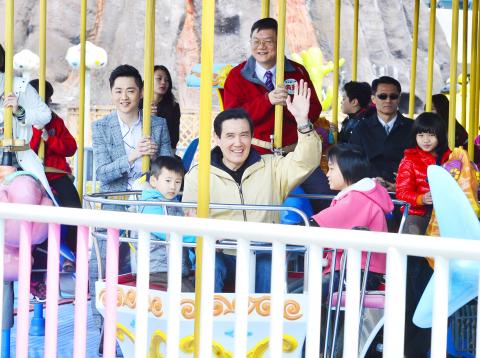President Ma Ying-jeou (馬英九) said in an interview released yesterday that both he and Chinese President Xi Jinping (習近平) are well aware that the conditions for the unification of the two sides of the Taiwan Strait are lacking at present.
In an interview with CNN reporter Christiane Amanpour, Ma said that China certainly desires unification and has never given up on the idea, according to a Chinese-language transcript released by the Presidential Office.
However, China is willing to develop relations with Taiwan peacefully on the basis of the so-called “1992 consensus” of “one China, different interpretations” because it knows that pushing for immediate unification would not achieve good results and would even have serious consequences, Ma said.

Photo: Wang Yi-sung, Taipei Times
Former Mainland Affairs Council chairman Su Chi (蘇起) admitted making up the term “1992 consensus” in 2000.
During his meeting with Xi in Singapore in November last year, he told Xi that the “one China, different interpretations” model adhered to by the Republic of China (ROC) will not be interpreted as “two Chinas,” “one China, one Taiwan,” or “Taiwanese independence,” Ma said.
“Our interpretation is of course based on our Constitution, which can only be ‘the Republic of China,’” he said, adding that the model has provided an appropriate and mutually acceptable basis for cross-strait relations over the past eight years.
When asked to reflect on why the Chinese Nationalist Party (KMT) lost the Jan. 16 elections and whether he read the election results as a backlash against his China policy and cross-strait trade pacts, Ma said that while there are people in Taiwan opposed to his China policy, they only account for a small proportion, not a majority.
“We all understand that over the past eight years of my presidency, we have created a status quo, and this status quo has won the support of the majority,” he said.
When asked how Xi interpreted the election results and how he views president-elect Tsai Ing-wen (蔡英文), who “potentially has a slightly different view when it comes to relations with China,” Ma said Xi over the past year stressed on several occasions that “the 1992 consensus is the key.”
“Of course we hope that my successor will think carefully about supporting the 1992 consensus, allowing cross-strait ties to move ahead smoothly, so when Taiwan tries to develop its international relations, we can face a more friendly environment,” Ma said.
“I believe that the people of Taiwan support a free and democratic political system, and hope that the ROC will continue to become more free and democratic,” Ma said when asked about the younger generation in Taiwan, who might feel more nationalistic, preferring a full-blown democracy.”
“However, when we develop relations with China, we have to establish a mutually accepted consensus so that this relationship will move ahead peacefully and smoothly,” Ma said.
When asked about Itu Aba Island (Taiping Island, 太平島), Ma said the ROC recovered the island in 1946 and at the time, Vietnam and the Philippines did not express any opinion.
In 1956, Taiwan began stationing troops there, and has done so till now, he said, adding: “We have been in control of Taiping Island for 60 years.”

A strong continental cold air mass is to bring pollutants to Taiwan from tomorrow, the Ministry of Environment said today, as it issued an “orange” air quality alert for most of the country. All of Taiwan except for Hualien and Taitung counties is to be under an “orange” air quality alert tomorrow, indicating air quality that is unhealthy for sensitive groups. In China, areas from Shandong to Shanghai have been enveloped in haze since Saturday, the ministry said in a news release. Yesterday, hourly concentrations of PM2.5 in these areas ranged from 65 to 160 micrograms per cubic meter (mg/m³), and pollutants were

Taiwan’s armed forces have established response protocols for a wide range of sudden contingencies, including the “Wan Chun Plan” to protect the head of state, the Ministry of Defense (MND) said today. After US President Donald Trump on Saturday launched a series of airstrikes in Venezuela and kidnapped Venezuelan President Nicolas Maduro, concerns have been raised as to whether China would launch a similar “decapitation strike” on Taiwan. The armed forces regularly coordinate with relevant agencies and practice drills to ensure preparedness for a wide range of scenarios, Vice Minister of National Defense Hsu Szu-chien (徐斯儉) told reporters before a

EVA Airways on Saturday said that it had suspended a pilot and opened an investigation after he allegedly lost his temper and punched the first officer several times as their plane was taxiing before takeoff at Los Angeles International Airport. According to a report published on Thursday by The Reporter, the incident occurred after the flight’s Malaysian first officer tried to warn the Taiwanese pilot, surnamed Wen (文), that he was taxiing faster than the speed limit of 30 knots (55.6kph). After alerting the pilot several times without response, the first officer manually applied the brakes in accordance with standard operating

NOT AN OPENING: Trump’s violation of international law does not affect China’s consideration in attacking Taiwan; Beijing lacks capability, not precedent, an official said Taiwanese officials see the US’ capture of the president of Venezuela as a powerful deterrent to Beijing’s aggression and a timely reminder of the US’ ability to defeat militaries equipped with Chinese-made weapons. The strikes that toppled Venezuelan President Nicolas Maduro signaled to authoritarian leaders, including Chinese President Xi Jinping (習近平), US President Donald Trump’s willingness to use military might for international affairs core to US interests, one senior official in Taipei’s security circle said. That reassured Taiwan, the person said. Taipei has also dismissed the idea that Trump’s apparent violation of international law could embolden Beijing, said the official, who was not